University Audit Report: Technology in Audit Engagements - ACC621
VerifiedAdded on 2022/11/10
|10
|2265
|346
Report
AI Summary
This report, prepared for ACC621, investigates the influence of technology on audit engagements. It addresses the concerns of an audit professional regarding the potential redundancy of auditors due to technological advancements. The report examines three key technologies: data analytics, cloud and cognitive technology, and leveraging technology, assessing their impact on the audit profession. It discusses the disruptive potential of each technology, considering issues such as data integrity, security concerns, and the limitations of replacing human judgment. The report explores the potential of technology to replace human auditors, concluding that while technology offers significant advantages, it is unlikely to fully replace auditors in the near future due to the need for critical thinking and investigative skills. Finally, the report recommends the adoption of cloud and cognitive technology, emphasizing their benefits for firms in the current landscape. References are provided to support the analysis and conclusions.
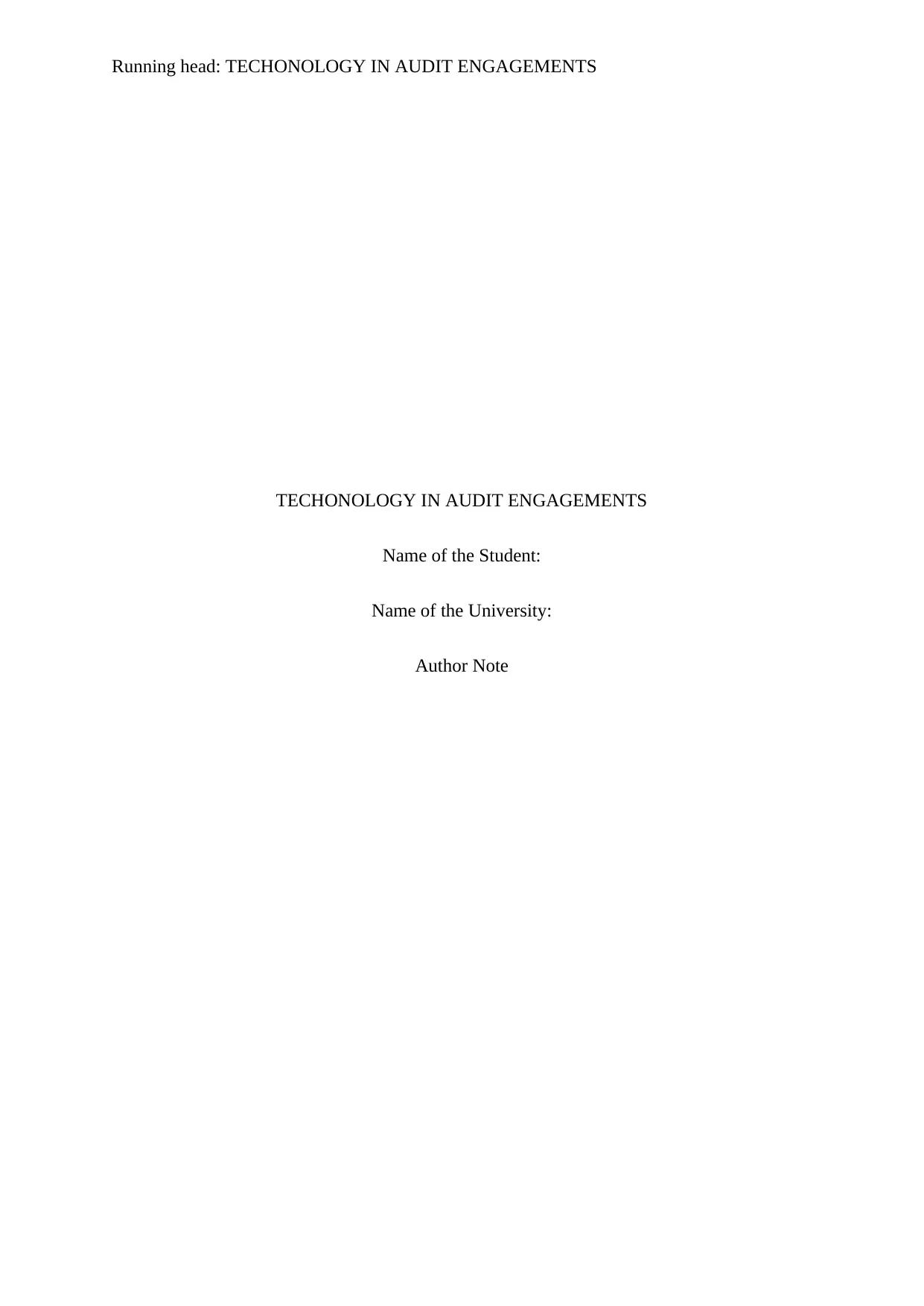
Running head: TECHONOLOGY IN AUDIT ENGAGEMENTS
TECHONOLOGY IN AUDIT ENGAGEMENTS
Name of the Student:
Name of the University:
Author Note
TECHONOLOGY IN AUDIT ENGAGEMENTS
Name of the Student:
Name of the University:
Author Note
Paraphrase This Document
Need a fresh take? Get an instant paraphrase of this document with our AI Paraphraser
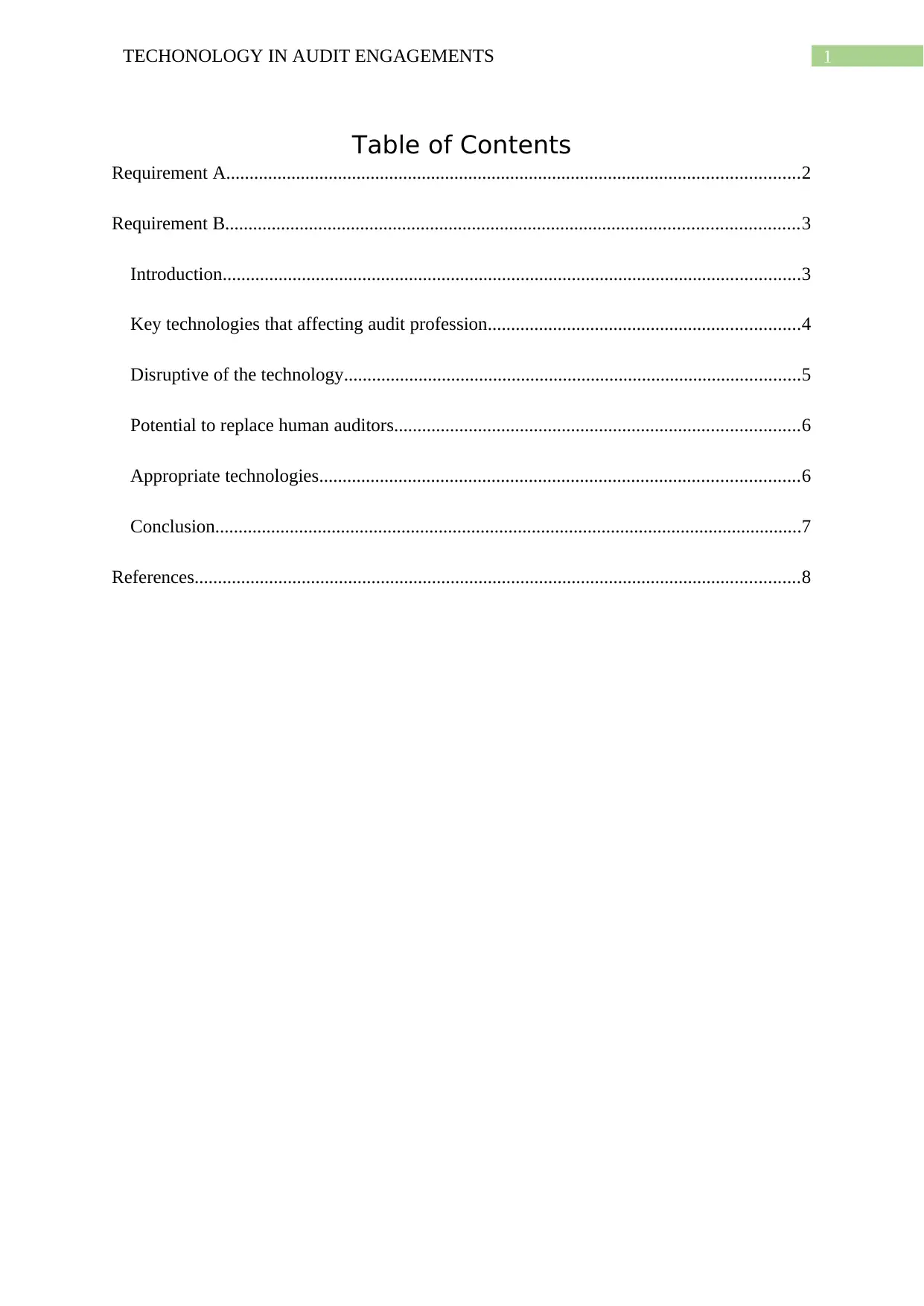
1TECHONOLOGY IN AUDIT ENGAGEMENTS
Table of Contents
Requirement A...........................................................................................................................2
Requirement B...........................................................................................................................3
Introduction............................................................................................................................3
Key technologies that affecting audit profession...................................................................4
Disruptive of the technology..................................................................................................5
Potential to replace human auditors.......................................................................................6
Appropriate technologies.......................................................................................................6
Conclusion..............................................................................................................................7
References..................................................................................................................................8
Table of Contents
Requirement A...........................................................................................................................2
Requirement B...........................................................................................................................3
Introduction............................................................................................................................3
Key technologies that affecting audit profession...................................................................4
Disruptive of the technology..................................................................................................5
Potential to replace human auditors.......................................................................................6
Appropriate technologies.......................................................................................................6
Conclusion..............................................................................................................................7
References..................................................................................................................................8
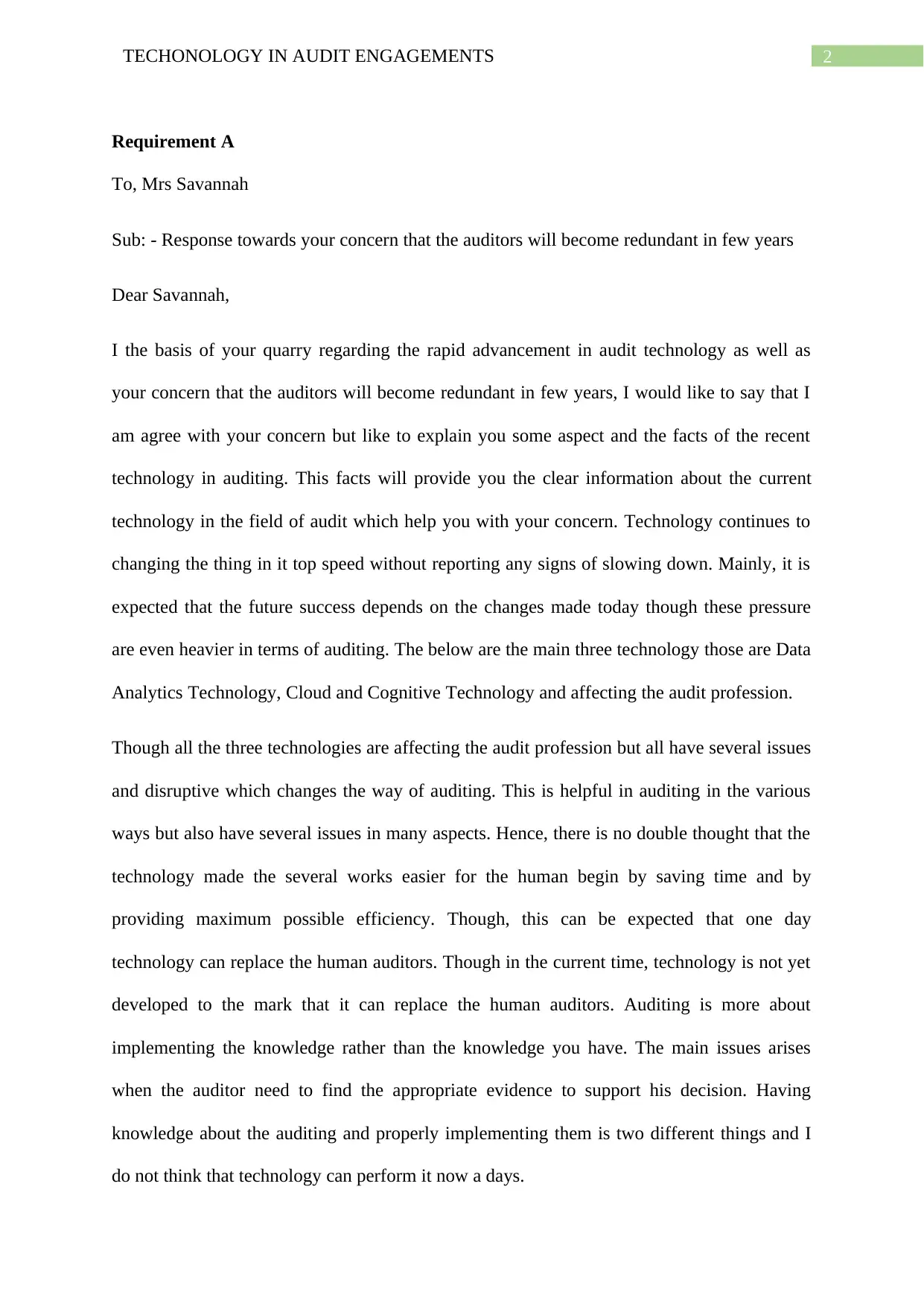
2TECHONOLOGY IN AUDIT ENGAGEMENTS
Requirement A
To, Mrs Savannah
Sub: - Response towards your concern that the auditors will become redundant in few years
Dear Savannah,
I the basis of your quarry regarding the rapid advancement in audit technology as well as
your concern that the auditors will become redundant in few years, I would like to say that I
am agree with your concern but like to explain you some aspect and the facts of the recent
technology in auditing. This facts will provide you the clear information about the current
technology in the field of audit which help you with your concern. Technology continues to
changing the thing in it top speed without reporting any signs of slowing down. Mainly, it is
expected that the future success depends on the changes made today though these pressure
are even heavier in terms of auditing. The below are the main three technology those are Data
Analytics Technology, Cloud and Cognitive Technology and affecting the audit profession.
Though all the three technologies are affecting the audit profession but all have several issues
and disruptive which changes the way of auditing. This is helpful in auditing in the various
ways but also have several issues in many aspects. Hence, there is no double thought that the
technology made the several works easier for the human begin by saving time and by
providing maximum possible efficiency. Though, this can be expected that one day
technology can replace the human auditors. Though in the current time, technology is not yet
developed to the mark that it can replace the human auditors. Auditing is more about
implementing the knowledge rather than the knowledge you have. The main issues arises
when the auditor need to find the appropriate evidence to support his decision. Having
knowledge about the auditing and properly implementing them is two different things and I
do not think that technology can perform it now a days.
Requirement A
To, Mrs Savannah
Sub: - Response towards your concern that the auditors will become redundant in few years
Dear Savannah,
I the basis of your quarry regarding the rapid advancement in audit technology as well as
your concern that the auditors will become redundant in few years, I would like to say that I
am agree with your concern but like to explain you some aspect and the facts of the recent
technology in auditing. This facts will provide you the clear information about the current
technology in the field of audit which help you with your concern. Technology continues to
changing the thing in it top speed without reporting any signs of slowing down. Mainly, it is
expected that the future success depends on the changes made today though these pressure
are even heavier in terms of auditing. The below are the main three technology those are Data
Analytics Technology, Cloud and Cognitive Technology and affecting the audit profession.
Though all the three technologies are affecting the audit profession but all have several issues
and disruptive which changes the way of auditing. This is helpful in auditing in the various
ways but also have several issues in many aspects. Hence, there is no double thought that the
technology made the several works easier for the human begin by saving time and by
providing maximum possible efficiency. Though, this can be expected that one day
technology can replace the human auditors. Though in the current time, technology is not yet
developed to the mark that it can replace the human auditors. Auditing is more about
implementing the knowledge rather than the knowledge you have. The main issues arises
when the auditor need to find the appropriate evidence to support his decision. Having
knowledge about the auditing and properly implementing them is two different things and I
do not think that technology can perform it now a days.
⊘ This is a preview!⊘
Do you want full access?
Subscribe today to unlock all pages.

Trusted by 1+ million students worldwide
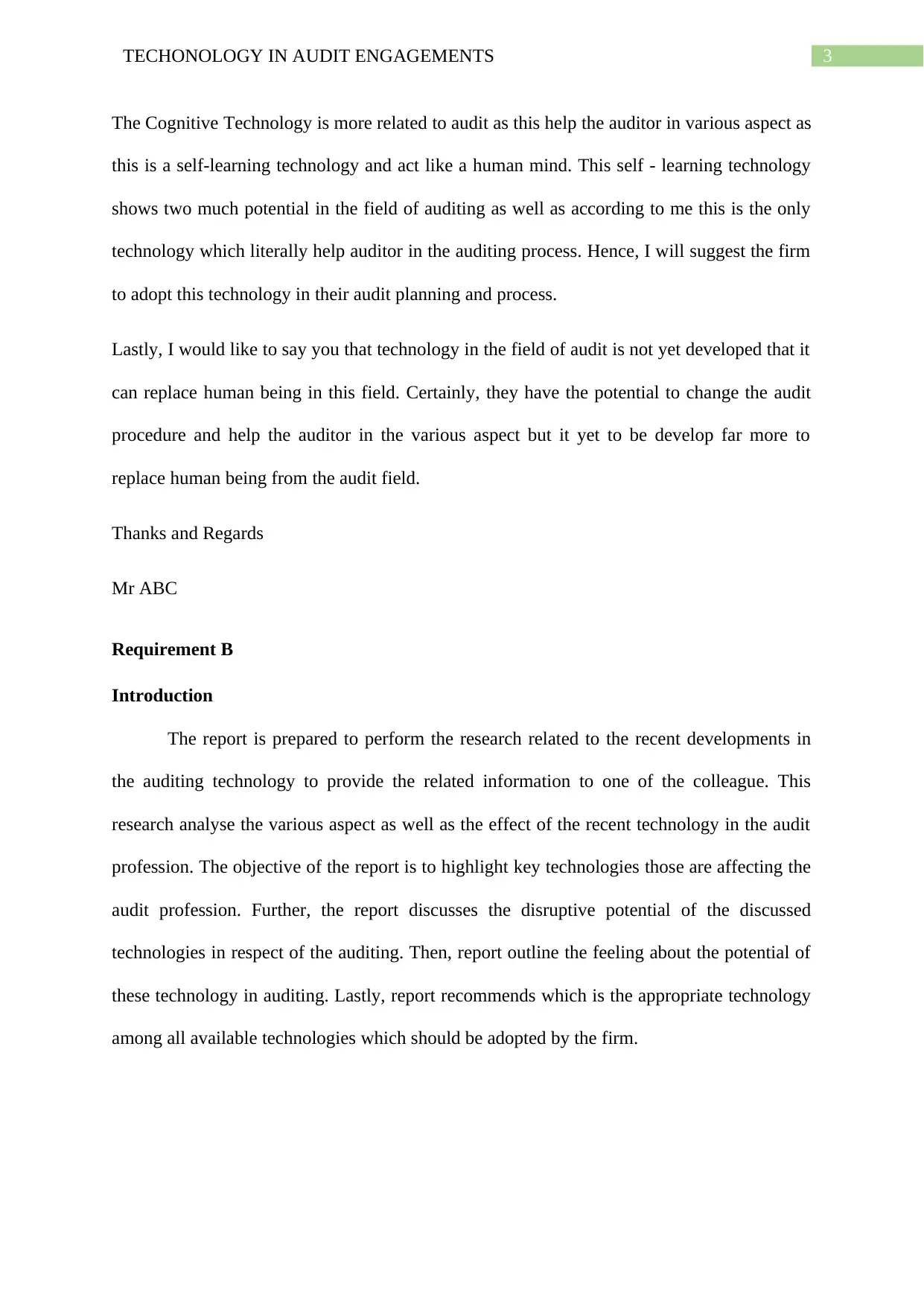
3TECHONOLOGY IN AUDIT ENGAGEMENTS
The Cognitive Technology is more related to audit as this help the auditor in various aspect as
this is a self-learning technology and act like a human mind. This self - learning technology
shows two much potential in the field of auditing as well as according to me this is the only
technology which literally help auditor in the auditing process. Hence, I will suggest the firm
to adopt this technology in their audit planning and process.
Lastly, I would like to say you that technology in the field of audit is not yet developed that it
can replace human being in this field. Certainly, they have the potential to change the audit
procedure and help the auditor in the various aspect but it yet to be develop far more to
replace human being from the audit field.
Thanks and Regards
Mr ABC
Requirement B
Introduction
The report is prepared to perform the research related to the recent developments in
the auditing technology to provide the related information to one of the colleague. This
research analyse the various aspect as well as the effect of the recent technology in the audit
profession. The objective of the report is to highlight key technologies those are affecting the
audit profession. Further, the report discusses the disruptive potential of the discussed
technologies in respect of the auditing. Then, report outline the feeling about the potential of
these technology in auditing. Lastly, report recommends which is the appropriate technology
among all available technologies which should be adopted by the firm.
The Cognitive Technology is more related to audit as this help the auditor in various aspect as
this is a self-learning technology and act like a human mind. This self - learning technology
shows two much potential in the field of auditing as well as according to me this is the only
technology which literally help auditor in the auditing process. Hence, I will suggest the firm
to adopt this technology in their audit planning and process.
Lastly, I would like to say you that technology in the field of audit is not yet developed that it
can replace human being in this field. Certainly, they have the potential to change the audit
procedure and help the auditor in the various aspect but it yet to be develop far more to
replace human being from the audit field.
Thanks and Regards
Mr ABC
Requirement B
Introduction
The report is prepared to perform the research related to the recent developments in
the auditing technology to provide the related information to one of the colleague. This
research analyse the various aspect as well as the effect of the recent technology in the audit
profession. The objective of the report is to highlight key technologies those are affecting the
audit profession. Further, the report discusses the disruptive potential of the discussed
technologies in respect of the auditing. Then, report outline the feeling about the potential of
these technology in auditing. Lastly, report recommends which is the appropriate technology
among all available technologies which should be adopted by the firm.
Paraphrase This Document
Need a fresh take? Get an instant paraphrase of this document with our AI Paraphraser
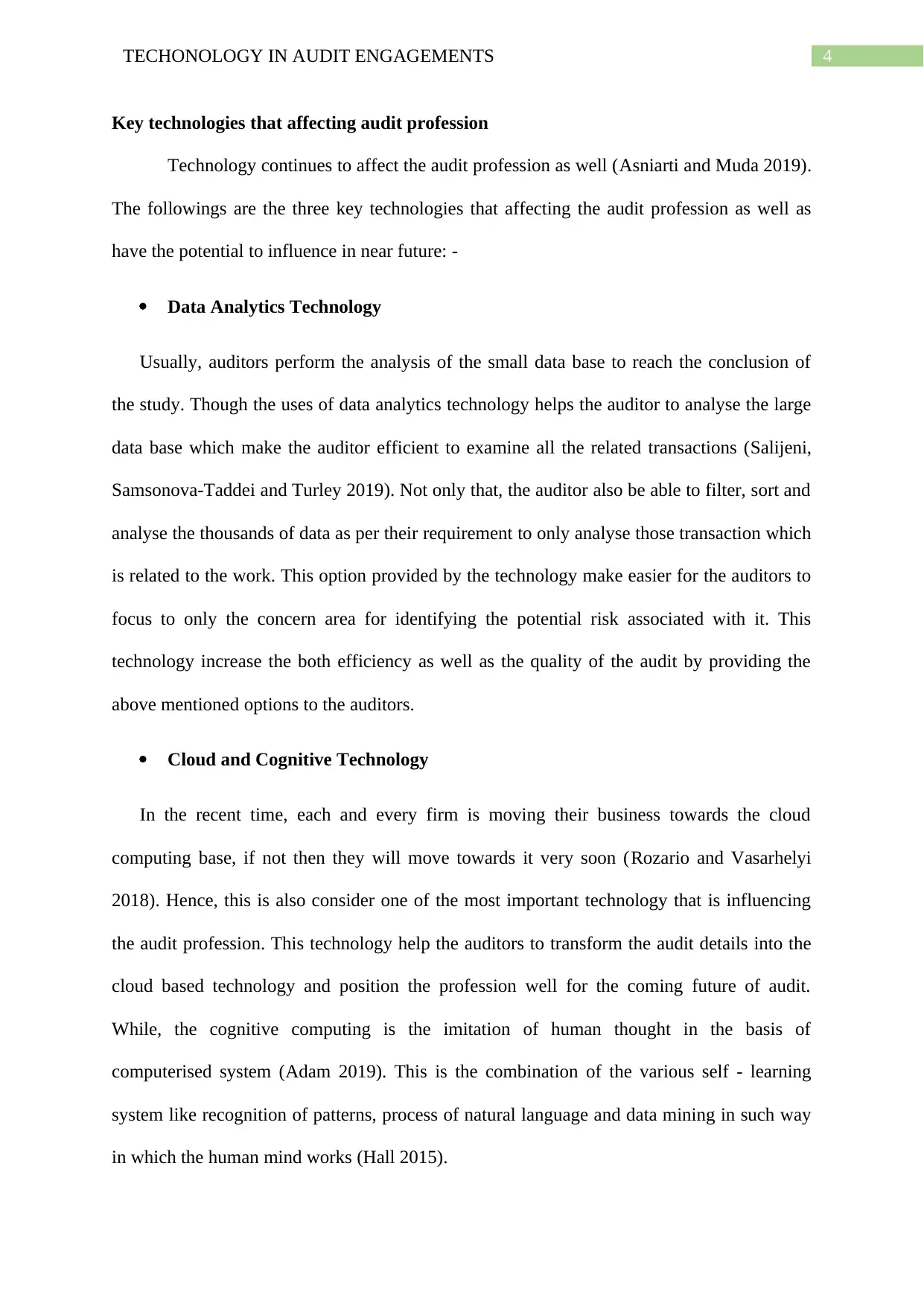
4TECHONOLOGY IN AUDIT ENGAGEMENTS
Key technologies that affecting audit profession
Technology continues to affect the audit profession as well (Asniarti and Muda 2019).
The followings are the three key technologies that affecting the audit profession as well as
have the potential to influence in near future: -
Data Analytics Technology
Usually, auditors perform the analysis of the small data base to reach the conclusion of
the study. Though the uses of data analytics technology helps the auditor to analyse the large
data base which make the auditor efficient to examine all the related transactions (Salijeni,
Samsonova-Taddei and Turley 2019). Not only that, the auditor also be able to filter, sort and
analyse the thousands of data as per their requirement to only analyse those transaction which
is related to the work. This option provided by the technology make easier for the auditors to
focus to only the concern area for identifying the potential risk associated with it. This
technology increase the both efficiency as well as the quality of the audit by providing the
above mentioned options to the auditors.
Cloud and Cognitive Technology
In the recent time, each and every firm is moving their business towards the cloud
computing base, if not then they will move towards it very soon (Rozario and Vasarhelyi
2018). Hence, this is also consider one of the most important technology that is influencing
the audit profession. This technology help the auditors to transform the audit details into the
cloud based technology and position the profession well for the coming future of audit.
While, the cognitive computing is the imitation of human thought in the basis of
computerised system (Adam 2019). This is the combination of the various self - learning
system like recognition of patterns, process of natural language and data mining in such way
in which the human mind works (Hall 2015).
Key technologies that affecting audit profession
Technology continues to affect the audit profession as well (Asniarti and Muda 2019).
The followings are the three key technologies that affecting the audit profession as well as
have the potential to influence in near future: -
Data Analytics Technology
Usually, auditors perform the analysis of the small data base to reach the conclusion of
the study. Though the uses of data analytics technology helps the auditor to analyse the large
data base which make the auditor efficient to examine all the related transactions (Salijeni,
Samsonova-Taddei and Turley 2019). Not only that, the auditor also be able to filter, sort and
analyse the thousands of data as per their requirement to only analyse those transaction which
is related to the work. This option provided by the technology make easier for the auditors to
focus to only the concern area for identifying the potential risk associated with it. This
technology increase the both efficiency as well as the quality of the audit by providing the
above mentioned options to the auditors.
Cloud and Cognitive Technology
In the recent time, each and every firm is moving their business towards the cloud
computing base, if not then they will move towards it very soon (Rozario and Vasarhelyi
2018). Hence, this is also consider one of the most important technology that is influencing
the audit profession. This technology help the auditors to transform the audit details into the
cloud based technology and position the profession well for the coming future of audit.
While, the cognitive computing is the imitation of human thought in the basis of
computerised system (Adam 2019). This is the combination of the various self - learning
system like recognition of patterns, process of natural language and data mining in such way
in which the human mind works (Hall 2015).
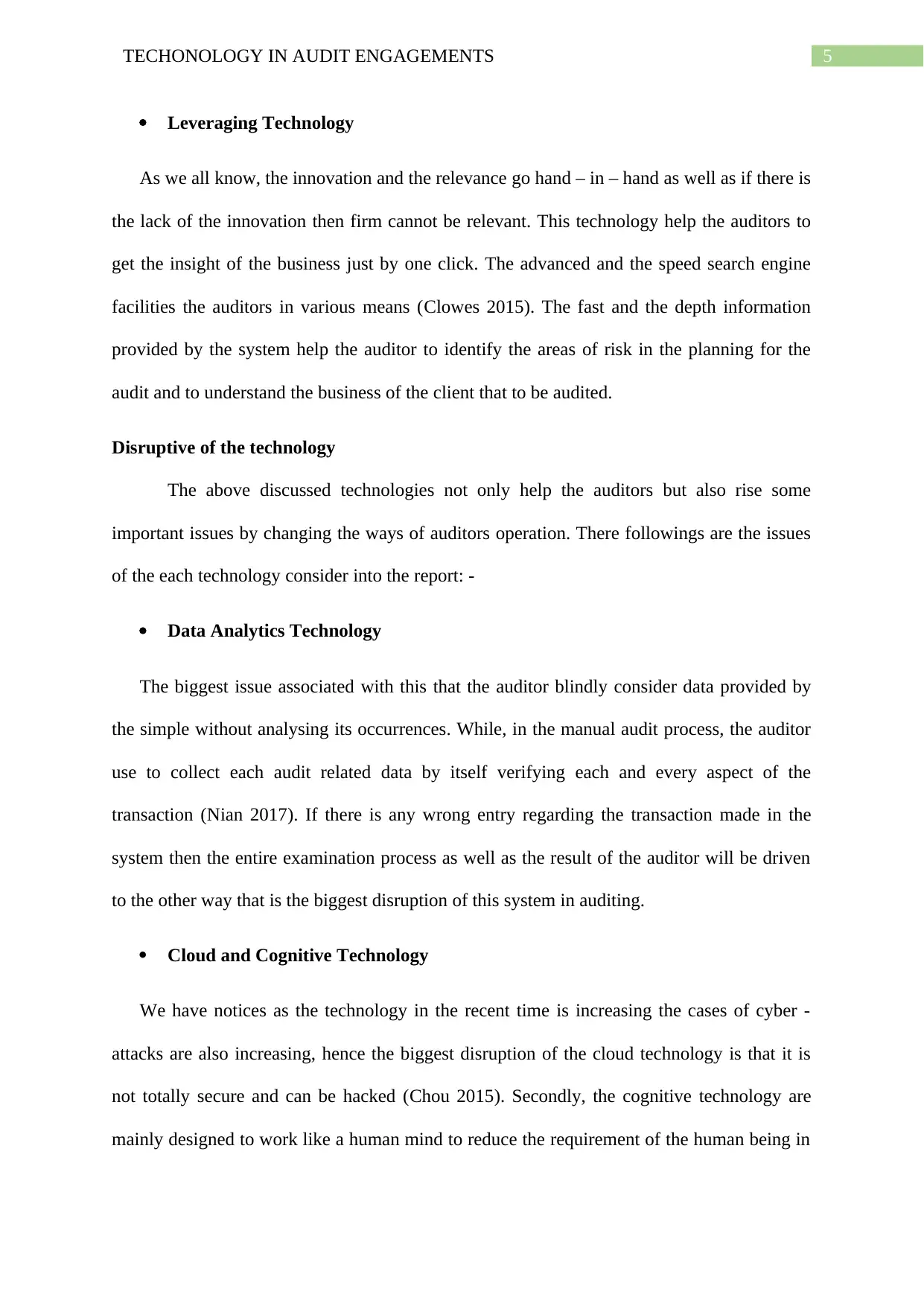
5TECHONOLOGY IN AUDIT ENGAGEMENTS
Leveraging Technology
As we all know, the innovation and the relevance go hand – in – hand as well as if there is
the lack of the innovation then firm cannot be relevant. This technology help the auditors to
get the insight of the business just by one click. The advanced and the speed search engine
facilities the auditors in various means (Clowes 2015). The fast and the depth information
provided by the system help the auditor to identify the areas of risk in the planning for the
audit and to understand the business of the client that to be audited.
Disruptive of the technology
The above discussed technologies not only help the auditors but also rise some
important issues by changing the ways of auditors operation. There followings are the issues
of the each technology consider into the report: -
Data Analytics Technology
The biggest issue associated with this that the auditor blindly consider data provided by
the simple without analysing its occurrences. While, in the manual audit process, the auditor
use to collect each audit related data by itself verifying each and every aspect of the
transaction (Nian 2017). If there is any wrong entry regarding the transaction made in the
system then the entire examination process as well as the result of the auditor will be driven
to the other way that is the biggest disruption of this system in auditing.
Cloud and Cognitive Technology
We have notices as the technology in the recent time is increasing the cases of cyber -
attacks are also increasing, hence the biggest disruption of the cloud technology is that it is
not totally secure and can be hacked (Chou 2015). Secondly, the cognitive technology are
mainly designed to work like a human mind to reduce the requirement of the human being in
Leveraging Technology
As we all know, the innovation and the relevance go hand – in – hand as well as if there is
the lack of the innovation then firm cannot be relevant. This technology help the auditors to
get the insight of the business just by one click. The advanced and the speed search engine
facilities the auditors in various means (Clowes 2015). The fast and the depth information
provided by the system help the auditor to identify the areas of risk in the planning for the
audit and to understand the business of the client that to be audited.
Disruptive of the technology
The above discussed technologies not only help the auditors but also rise some
important issues by changing the ways of auditors operation. There followings are the issues
of the each technology consider into the report: -
Data Analytics Technology
The biggest issue associated with this that the auditor blindly consider data provided by
the simple without analysing its occurrences. While, in the manual audit process, the auditor
use to collect each audit related data by itself verifying each and every aspect of the
transaction (Nian 2017). If there is any wrong entry regarding the transaction made in the
system then the entire examination process as well as the result of the auditor will be driven
to the other way that is the biggest disruption of this system in auditing.
Cloud and Cognitive Technology
We have notices as the technology in the recent time is increasing the cases of cyber -
attacks are also increasing, hence the biggest disruption of the cloud technology is that it is
not totally secure and can be hacked (Chou 2015). Secondly, the cognitive technology are
mainly designed to work like a human mind to reduce the requirement of the human being in
⊘ This is a preview!⊘
Do you want full access?
Subscribe today to unlock all pages.

Trusted by 1+ million students worldwide
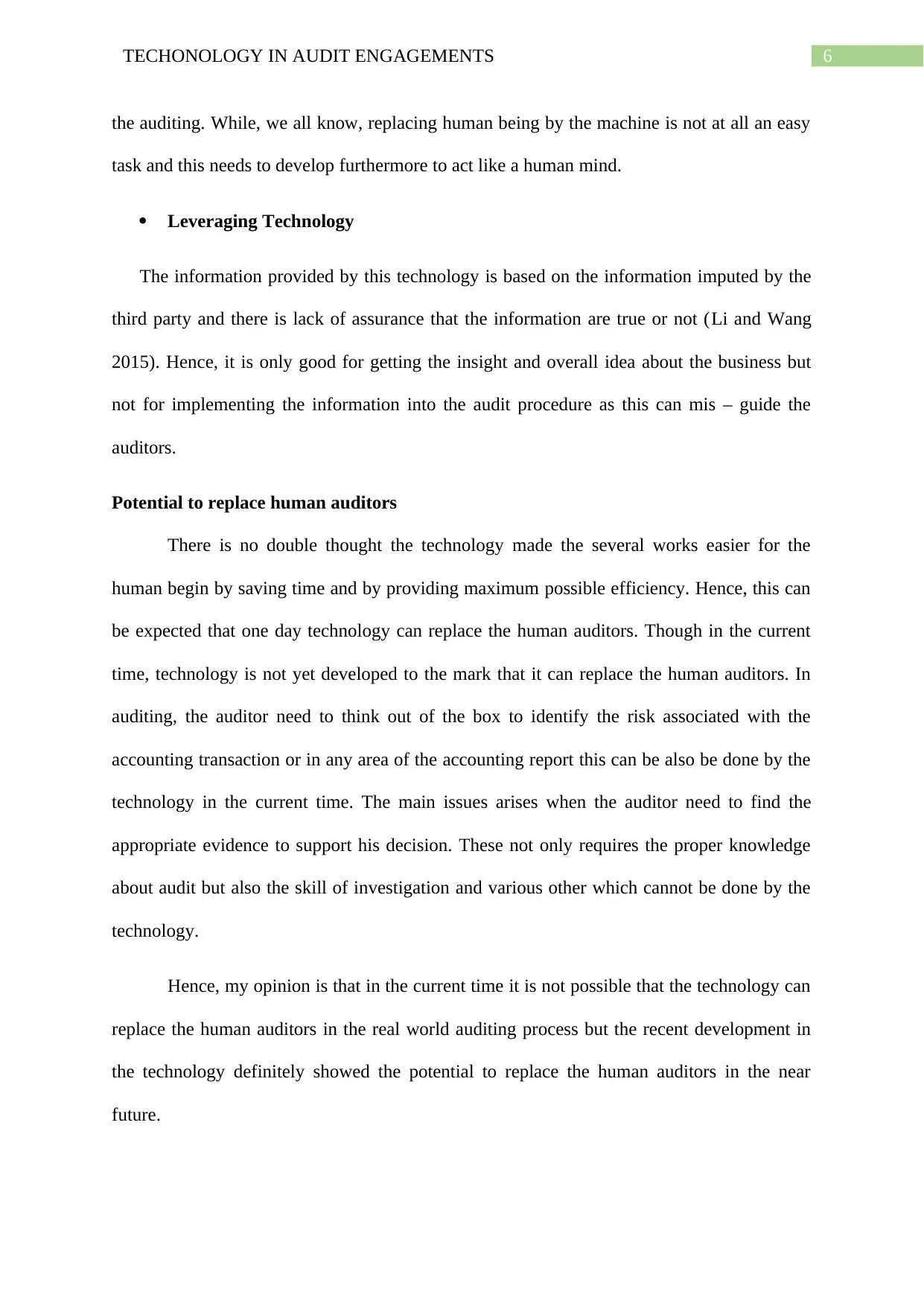
6TECHONOLOGY IN AUDIT ENGAGEMENTS
the auditing. While, we all know, replacing human being by the machine is not at all an easy
task and this needs to develop furthermore to act like a human mind.
Leveraging Technology
The information provided by this technology is based on the information imputed by the
third party and there is lack of assurance that the information are true or not (Li and Wang
2015). Hence, it is only good for getting the insight and overall idea about the business but
not for implementing the information into the audit procedure as this can mis – guide the
auditors.
Potential to replace human auditors
There is no double thought the technology made the several works easier for the
human begin by saving time and by providing maximum possible efficiency. Hence, this can
be expected that one day technology can replace the human auditors. Though in the current
time, technology is not yet developed to the mark that it can replace the human auditors. In
auditing, the auditor need to think out of the box to identify the risk associated with the
accounting transaction or in any area of the accounting report this can be also be done by the
technology in the current time. The main issues arises when the auditor need to find the
appropriate evidence to support his decision. These not only requires the proper knowledge
about audit but also the skill of investigation and various other which cannot be done by the
technology.
Hence, my opinion is that in the current time it is not possible that the technology can
replace the human auditors in the real world auditing process but the recent development in
the technology definitely showed the potential to replace the human auditors in the near
future.
the auditing. While, we all know, replacing human being by the machine is not at all an easy
task and this needs to develop furthermore to act like a human mind.
Leveraging Technology
The information provided by this technology is based on the information imputed by the
third party and there is lack of assurance that the information are true or not (Li and Wang
2015). Hence, it is only good for getting the insight and overall idea about the business but
not for implementing the information into the audit procedure as this can mis – guide the
auditors.
Potential to replace human auditors
There is no double thought the technology made the several works easier for the
human begin by saving time and by providing maximum possible efficiency. Hence, this can
be expected that one day technology can replace the human auditors. Though in the current
time, technology is not yet developed to the mark that it can replace the human auditors. In
auditing, the auditor need to think out of the box to identify the risk associated with the
accounting transaction or in any area of the accounting report this can be also be done by the
technology in the current time. The main issues arises when the auditor need to find the
appropriate evidence to support his decision. These not only requires the proper knowledge
about audit but also the skill of investigation and various other which cannot be done by the
technology.
Hence, my opinion is that in the current time it is not possible that the technology can
replace the human auditors in the real world auditing process but the recent development in
the technology definitely showed the potential to replace the human auditors in the near
future.
Paraphrase This Document
Need a fresh take? Get an instant paraphrase of this document with our AI Paraphraser
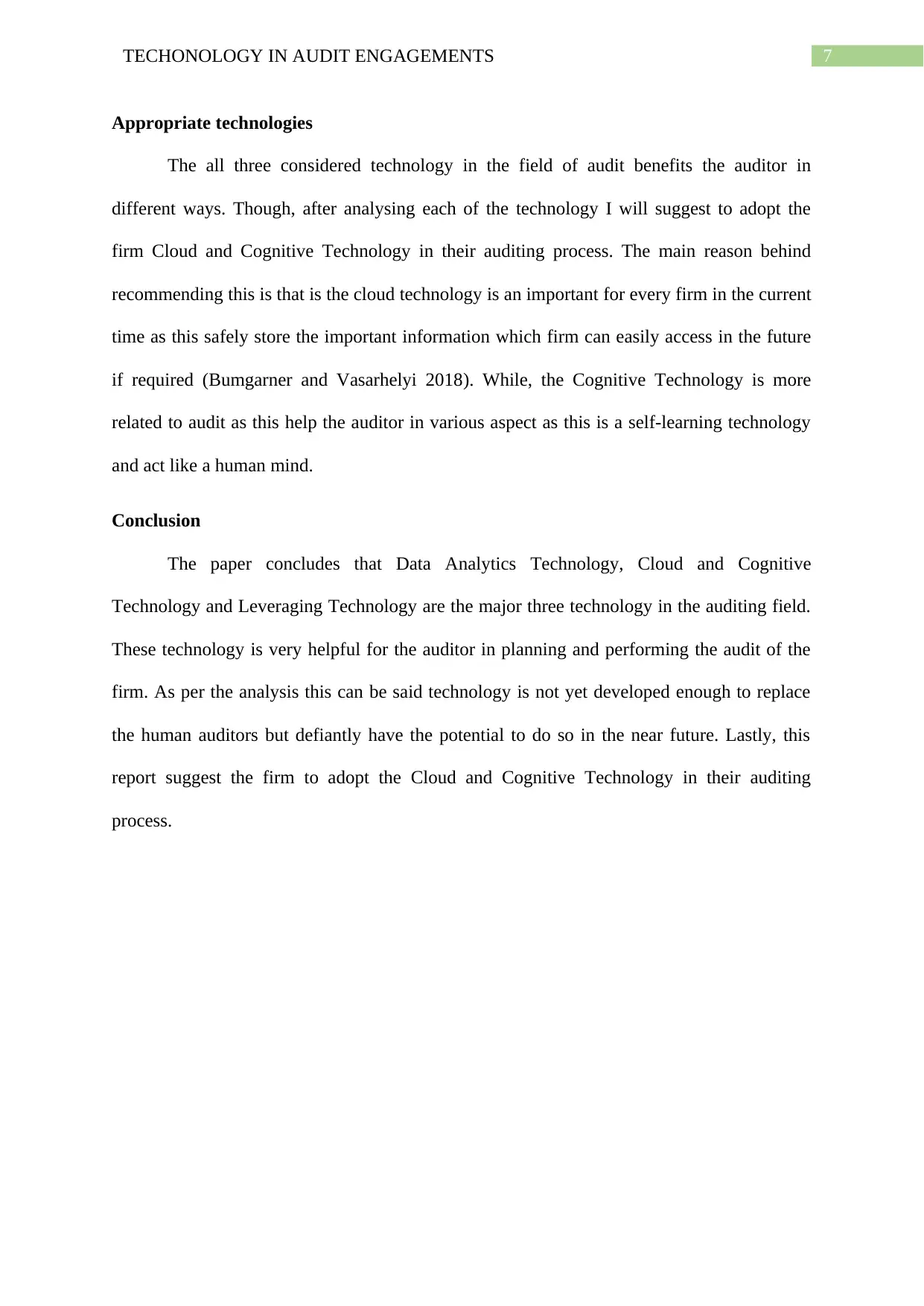
7TECHONOLOGY IN AUDIT ENGAGEMENTS
Appropriate technologies
The all three considered technology in the field of audit benefits the auditor in
different ways. Though, after analysing each of the technology I will suggest to adopt the
firm Cloud and Cognitive Technology in their auditing process. The main reason behind
recommending this is that is the cloud technology is an important for every firm in the current
time as this safely store the important information which firm can easily access in the future
if required (Bumgarner and Vasarhelyi 2018). While, the Cognitive Technology is more
related to audit as this help the auditor in various aspect as this is a self-learning technology
and act like a human mind.
Conclusion
The paper concludes that Data Analytics Technology, Cloud and Cognitive
Technology and Leveraging Technology are the major three technology in the auditing field.
These technology is very helpful for the auditor in planning and performing the audit of the
firm. As per the analysis this can be said technology is not yet developed enough to replace
the human auditors but defiantly have the potential to do so in the near future. Lastly, this
report suggest the firm to adopt the Cloud and Cognitive Technology in their auditing
process.
Appropriate technologies
The all three considered technology in the field of audit benefits the auditor in
different ways. Though, after analysing each of the technology I will suggest to adopt the
firm Cloud and Cognitive Technology in their auditing process. The main reason behind
recommending this is that is the cloud technology is an important for every firm in the current
time as this safely store the important information which firm can easily access in the future
if required (Bumgarner and Vasarhelyi 2018). While, the Cognitive Technology is more
related to audit as this help the auditor in various aspect as this is a self-learning technology
and act like a human mind.
Conclusion
The paper concludes that Data Analytics Technology, Cloud and Cognitive
Technology and Leveraging Technology are the major three technology in the auditing field.
These technology is very helpful for the auditor in planning and performing the audit of the
firm. As per the analysis this can be said technology is not yet developed enough to replace
the human auditors but defiantly have the potential to do so in the near future. Lastly, this
report suggest the firm to adopt the Cloud and Cognitive Technology in their auditing
process.
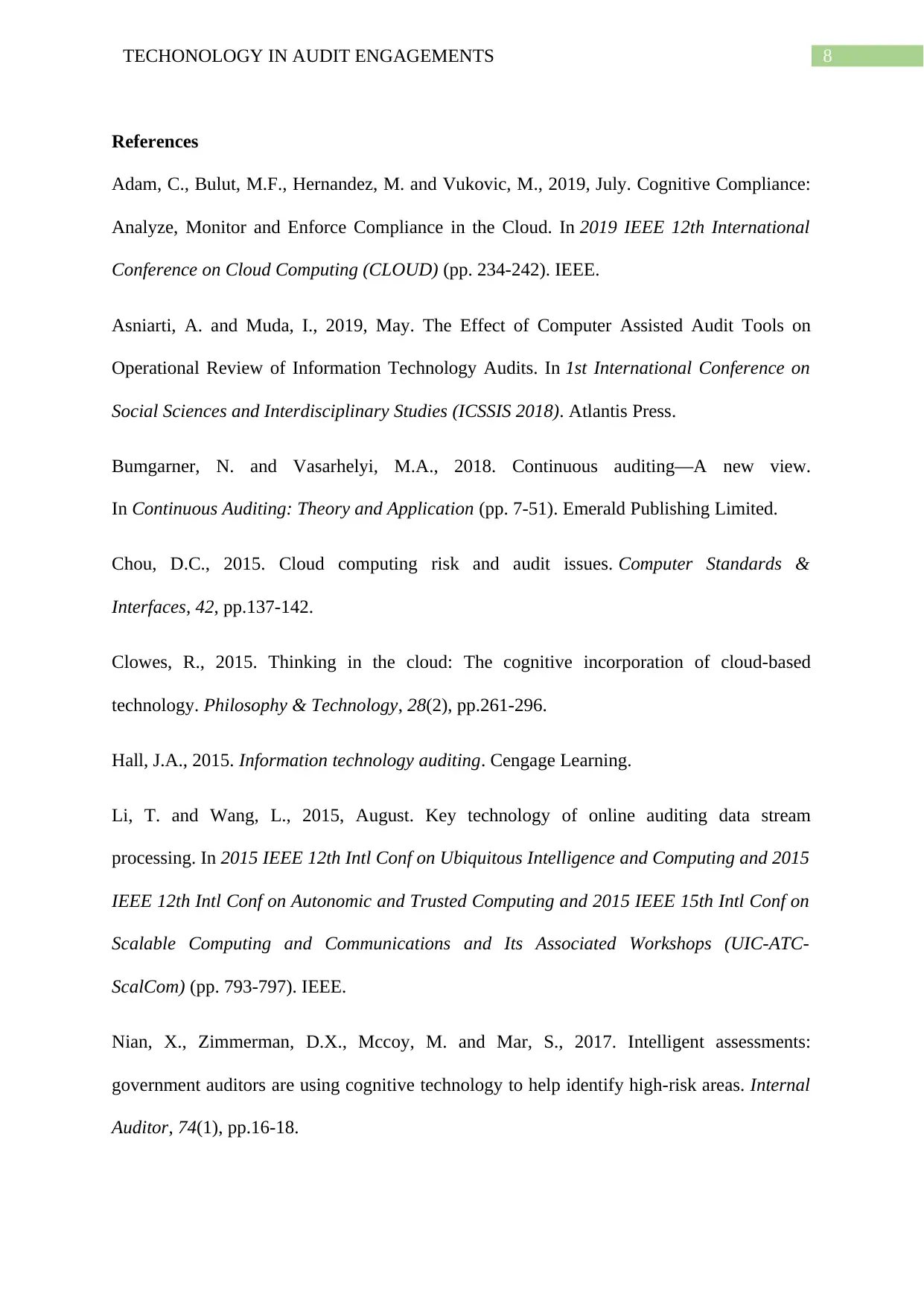
8TECHONOLOGY IN AUDIT ENGAGEMENTS
References
Adam, C., Bulut, M.F., Hernandez, M. and Vukovic, M., 2019, July. Cognitive Compliance:
Analyze, Monitor and Enforce Compliance in the Cloud. In 2019 IEEE 12th International
Conference on Cloud Computing (CLOUD) (pp. 234-242). IEEE.
Asniarti, A. and Muda, I., 2019, May. The Effect of Computer Assisted Audit Tools on
Operational Review of Information Technology Audits. In 1st International Conference on
Social Sciences and Interdisciplinary Studies (ICSSIS 2018). Atlantis Press.
Bumgarner, N. and Vasarhelyi, M.A., 2018. Continuous auditing—A new view.
In Continuous Auditing: Theory and Application (pp. 7-51). Emerald Publishing Limited.
Chou, D.C., 2015. Cloud computing risk and audit issues. Computer Standards &
Interfaces, 42, pp.137-142.
Clowes, R., 2015. Thinking in the cloud: The cognitive incorporation of cloud-based
technology. Philosophy & Technology, 28(2), pp.261-296.
Hall, J.A., 2015. Information technology auditing. Cengage Learning.
Li, T. and Wang, L., 2015, August. Key technology of online auditing data stream
processing. In 2015 IEEE 12th Intl Conf on Ubiquitous Intelligence and Computing and 2015
IEEE 12th Intl Conf on Autonomic and Trusted Computing and 2015 IEEE 15th Intl Conf on
Scalable Computing and Communications and Its Associated Workshops (UIC-ATC-
ScalCom) (pp. 793-797). IEEE.
Nian, X., Zimmerman, D.X., Mccoy, M. and Mar, S., 2017. Intelligent assessments:
government auditors are using cognitive technology to help identify high-risk areas. Internal
Auditor, 74(1), pp.16-18.
References
Adam, C., Bulut, M.F., Hernandez, M. and Vukovic, M., 2019, July. Cognitive Compliance:
Analyze, Monitor and Enforce Compliance in the Cloud. In 2019 IEEE 12th International
Conference on Cloud Computing (CLOUD) (pp. 234-242). IEEE.
Asniarti, A. and Muda, I., 2019, May. The Effect of Computer Assisted Audit Tools on
Operational Review of Information Technology Audits. In 1st International Conference on
Social Sciences and Interdisciplinary Studies (ICSSIS 2018). Atlantis Press.
Bumgarner, N. and Vasarhelyi, M.A., 2018. Continuous auditing—A new view.
In Continuous Auditing: Theory and Application (pp. 7-51). Emerald Publishing Limited.
Chou, D.C., 2015. Cloud computing risk and audit issues. Computer Standards &
Interfaces, 42, pp.137-142.
Clowes, R., 2015. Thinking in the cloud: The cognitive incorporation of cloud-based
technology. Philosophy & Technology, 28(2), pp.261-296.
Hall, J.A., 2015. Information technology auditing. Cengage Learning.
Li, T. and Wang, L., 2015, August. Key technology of online auditing data stream
processing. In 2015 IEEE 12th Intl Conf on Ubiquitous Intelligence and Computing and 2015
IEEE 12th Intl Conf on Autonomic and Trusted Computing and 2015 IEEE 15th Intl Conf on
Scalable Computing and Communications and Its Associated Workshops (UIC-ATC-
ScalCom) (pp. 793-797). IEEE.
Nian, X., Zimmerman, D.X., Mccoy, M. and Mar, S., 2017. Intelligent assessments:
government auditors are using cognitive technology to help identify high-risk areas. Internal
Auditor, 74(1), pp.16-18.
⊘ This is a preview!⊘
Do you want full access?
Subscribe today to unlock all pages.

Trusted by 1+ million students worldwide
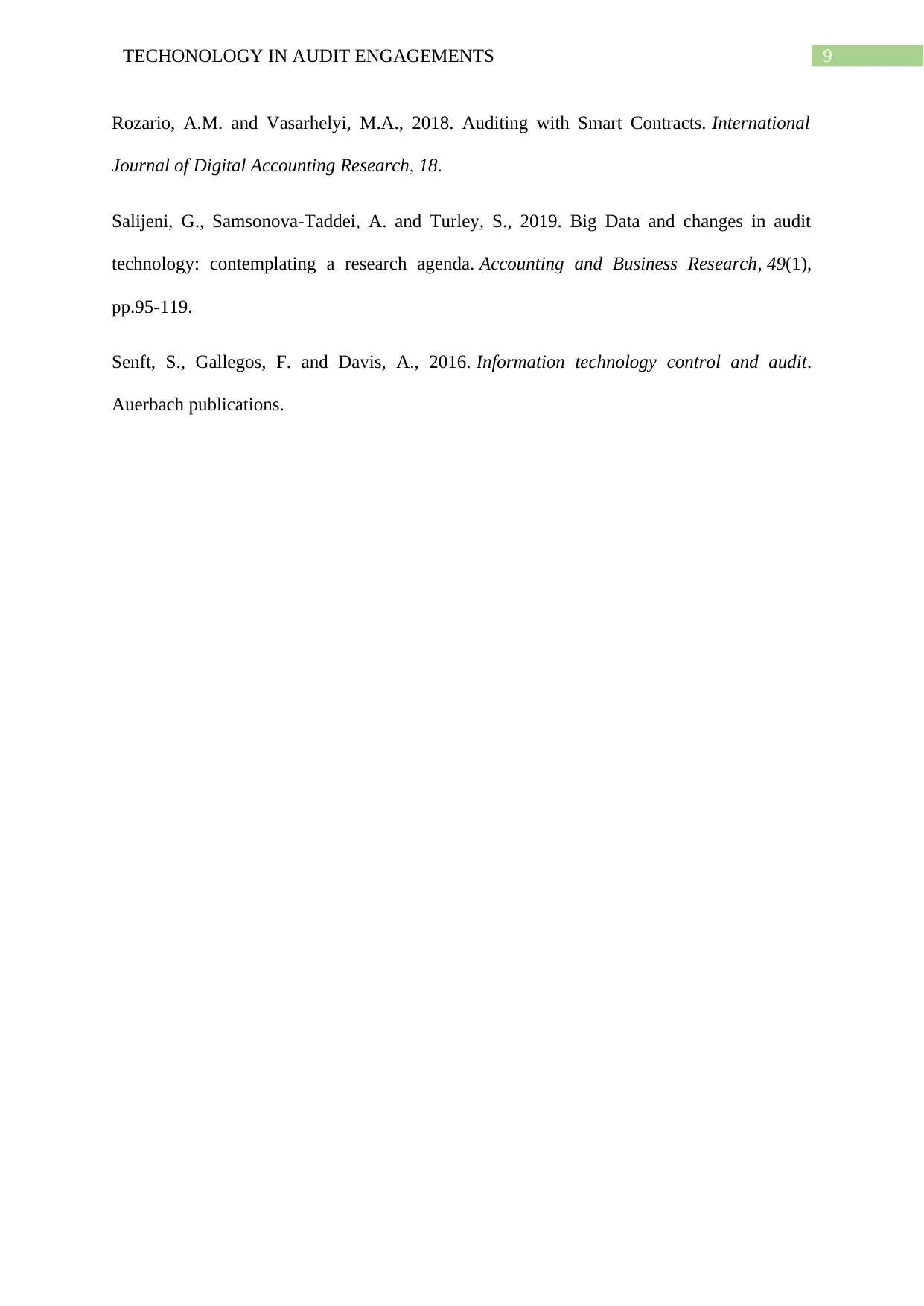
9TECHONOLOGY IN AUDIT ENGAGEMENTS
Rozario, A.M. and Vasarhelyi, M.A., 2018. Auditing with Smart Contracts. International
Journal of Digital Accounting Research, 18.
Salijeni, G., Samsonova-Taddei, A. and Turley, S., 2019. Big Data and changes in audit
technology: contemplating a research agenda. Accounting and Business Research, 49(1),
pp.95-119.
Senft, S., Gallegos, F. and Davis, A., 2016. Information technology control and audit.
Auerbach publications.
Rozario, A.M. and Vasarhelyi, M.A., 2018. Auditing with Smart Contracts. International
Journal of Digital Accounting Research, 18.
Salijeni, G., Samsonova-Taddei, A. and Turley, S., 2019. Big Data and changes in audit
technology: contemplating a research agenda. Accounting and Business Research, 49(1),
pp.95-119.
Senft, S., Gallegos, F. and Davis, A., 2016. Information technology control and audit.
Auerbach publications.
1 out of 10
Related Documents
Your All-in-One AI-Powered Toolkit for Academic Success.
+13062052269
info@desklib.com
Available 24*7 on WhatsApp / Email
![[object Object]](/_next/static/media/star-bottom.7253800d.svg)
Unlock your academic potential
Copyright © 2020–2026 A2Z Services. All Rights Reserved. Developed and managed by ZUCOL.




